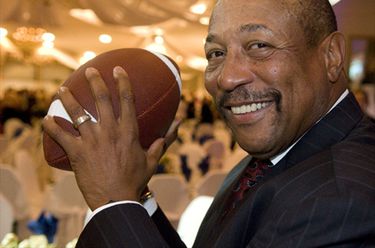Bond
Shared Stories: Chuck Ealey
Diversity is about celebrating and valuing the different perspectives and lived experiences of all people, and it’s a core belief at Bond. To kick off our new “Shared Stories” series and to celebrate Black History Month, we recently hosted an inspiring talk by history maker and football legend Chuck Ealey.
Having grown up in a poor, segregated community in small-town Ohio, Ealey beat the odds and became a star quarterback. His 35-game winning streak at the University of Toledo still stands as the most consecutive wins by a quarterback in U.S. college football history. Ealey is also the first African-American quarterback to win the CFL’s Grey Cup. His life story is captured in the memoir, “The Stone Thrower: A Daughter’s Lesson, a Father’s Life, written by his daughter, Jael Ealey Richardson.
In Bond’s first “Shared Stories” event, Ealey shared his story of perseverance and imparted lessons we can all use in our lives and in the workplace.

Rising to the Top of His Game
Born in 1950, Ealey grew up in the projects in racially segregated Portsmouth, Ohio. “This was a city that basically had an area for African Americans to live in [and another] where only white people lived at that time,” recalled Ealey.
Ealey said he doesn’t remember ever living with his father, and his mother had only a grade eight education. Though she didn’t have opportunities in her own life, she enforced upon her son the importance of education. Ealey realized early on that sport would be a way to further his education. “While I lived in this community, as tough as it was, sport became a great vehicle for us as the kids who grew up there,” he said.
Ealey attended Notre Dame, a predominately white Catholic high school. There, he led the football team to two state championships. The title of his daughter’s book is a reference to how Ealey practiced his passing skills by targeting lettering on boxcars when the train went through town. “I would pick up a big stone, I would drop back as a quarterback and I would practice throwing the ball and timing of hitting these images on the train,” recalled Ealey.
After high school, Ealey went to the University of Toledo on a football scholarship. “The particular time I was going to university—the late 60s and early 70s—was probably the most difficult time in American history,” said Ealey, referencing the Civil Rights movement, Vietnam War, the Black Power movement, Women’s Liberation movement, and Kent State shootings. “We were caught up in a lot of social elements in the midst of getting a football team to work, to be able to play together and being one,” he said.
Despite the challenges, Ealey had an undefeated record as quarterback of the Toledo Rockets, was named MVP in three Tangerine Bowls, and was named Mid American Conference Player of the Year three years in a row, while earning his degree in Business Economics.
In his final year, Ealey had discussions with the NFL, but the organization wanted him for a position other than quarterback. “At that time, believe it or not... they thought African Americans didn’t have the brains to be able to run the team,” said Ealey. “I said [to my agent], ‘send them a letter and say if they don’t take me as a quarterback I’m not coming,’ and sure enough they didn’t take me.”
The CFL, however, did. Ealey signed as a quarterback for the Hamilton Tiger-Cats, and later played with the Winnipeg Blue Bombers and Toronto Argonauts. After seven seasons in the CFL, Ealey retired and joined the business world. He worked for John Deere for eight years, and then spent 30 years at Investors Group. He has spent the last 6 years at Bond as a Customer & Employee experience Coach supporting our clients with their CX transformation.
.jpg?width=1600&name=MicrosoftTeams-image_(9).jpg)
Inward, Outward, Upward
On his journey, Ealey learned three things that will help people navigate challenges and succeed in life and business: be inward, be outward and be upward.
Being inward means being the best you can be. Ealey quoted Henry Ford: “Whether you think you can, or you think you can’t, you’re right.”
“Resolve to control your destiny,” said Ealey. “Decide who you want to be and what you want to achieve and then strive boldly towards your vision.” When you’re in control of your own destiny, he added, “then you make things happen the way you need to have them happen.”
Being outward is about teamwork. “What does it mean to people?” asked Ealey. “How do you express teamwork with each other?” While people work individually, they should work together for a common cause and everyone has a role to play.
Ealey told the story of Charlie Plumb, who was a fighter pilot in the Vietnam War. On his 75th combat mission, his jet was shot down. Plumb parachuted out, was captured and spent six years as a prisoner of war. Years later, while sitting in a restaurant with his wife, a man recognized Plumb. He was the person who had packed Plumb’s parachute.
“Charlie stood up and hugged him because no matter how many people were on that [jet], whether they were the top gun or the man who packed the parachute, they were part of one team,” said Ealey. If the man hadn’t packed the parachute right, Charlie wouldn’t have survived. “And that’s what teamwork is always about.”
Being upward is about the principles that guide our values and attitudes. “What holds that glue together in your own head that allows you to make judgments about things?” said Ealey.
“Resolve to stay brutally optimistic,” he added. “See the opportunity in every difficulty and anticipate the most favourable outcome in every situation. Whatever you look for, that’s what you’ll find. We can get better or we can get bitter. It all depends on the lessons we draw from each experience.”